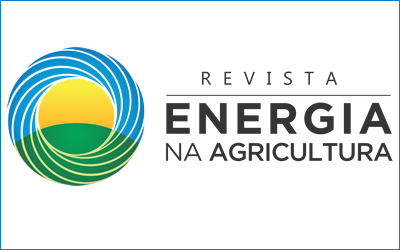ANÁLISE ENERGÉTICA E ECONÔMICA DA PRODUÇÃO DE LEITÕES POR PRODUTORES FAMILIARES DO OESTE DO PARANÁ
DOI:
https://doi.org/10.17224/EnergAgric.2013v28n2p103-108Resumen
O presente trabalho teve por objetivo analisar indicadores de eficiências energética e econômica da produção de leitões de produtores da agricultura familiar do Paraná. Procurou-se determinar possíveis diferenças nas eficiências energéticas e econômicas de produtores que fabricaram rações nas suas propriedades e àqueles que compraram rações da Cooperativa. A amostra foi obtida por acessibilidade (seis produtores que fabricaram e seis que compraram rações) e não probabilística, e os dados primários foram transformados em unidades energéticas e econômicas, e processados em planilhas eletrônicas. Os dois sistemas de produção de leitões, na fase de creche, da agricultura familiar, apresentaram balanços energéticos negativos, com entradas energéticas maiores que as saídas. Os dois sistemas de criação de leitões não apresentaram diferenças de eficiência energética, ou seja, os mesmos não foram autossuficientes e necessitaram importar fontes energéticas de outros sistemas. Os indicadores de eficiência econômica tanto dos produtores que compram rações quanto dos que as produzem nas suas propriedades foram menor que a unidade. Desse modo, a maioria dos produtores não gerou receitas suficientes para pagar as despesas no curto prazo e tiveram prejuízo.
Palavras-Chave: Análise energética, Análise econômica, leitões; produtores familiares, Oeste do Paraná
ENERGY AND ECONOMIC ANALYSIS OF PIGLETS PRODUCTION BY FAMILY PRODUCERS OF WEST PARANÁ
ABSTRACT: The present study analyzed indicators of energy and economic efficiencies of family farmers piglets production in Paraná. We determined the possible differences between energy and economic efficiencies of producers who manufactured piglets feed on their property and those who bought Cooperative’s piglets feed. The sample was obtained by accessibility (six producers who manufactured and six who bought piglets feed) and not probabilistic.The raw data was transformed into energy and economic units, and then, processed in electronic spreadsheets. The two piglets production systems showed negative energy balance, with energy inputs higher than outputs, in the nursery phase. The two systems of rearing piglets showed no differences in energy efficiency,in other words, they were not self-sufficient and needed to import energy sources from other systems. The indicators of economic efficiency of producers who bought piglets feed as those who produce it in their properties were less than an unity. Thus, most producers did not generate enough revenue to pay the costs in a short term and lost money.
Keywords: Energy analysis, economic analysis, piglets, family farmers, Western Paraná.
Descargas
Publicado
Cómo citar
Número
Sección
Licencia
Esta revista proporciona acesso publico a todo seu conteúdo, seguindo o princípio que tornar gratuito o acesso a pesquisas gera um maior intercâmbio global de conhecimento. Tal acesso está associado a um crescimento da leitura e citação do trabalho de um autor. Para maiores informações sobre esta abordagem, visite Public Knowledge Project, projeto que desenvolveu este sistema para melhorar a qualidade acadêmica e pública da pesquisa, distribuindo o OJS assim como outros software de apoio ao sistema de publicação de acesso público a fontes acadêmicas.





